Mental Health Nursing: Assessment, Stress Vulnerability Model, Recovery Oriented Practice
VerifiedAdded on 2022/11/22
|9
|2552
|201
AI Summary
This document discusses mental health nursing, including mental health assessment, stress vulnerability model, and recovery oriented practice. It also includes a summary of the content and references used.
Contribute Materials
Your contribution can guide someone’s learning journey. Share your
documents today.
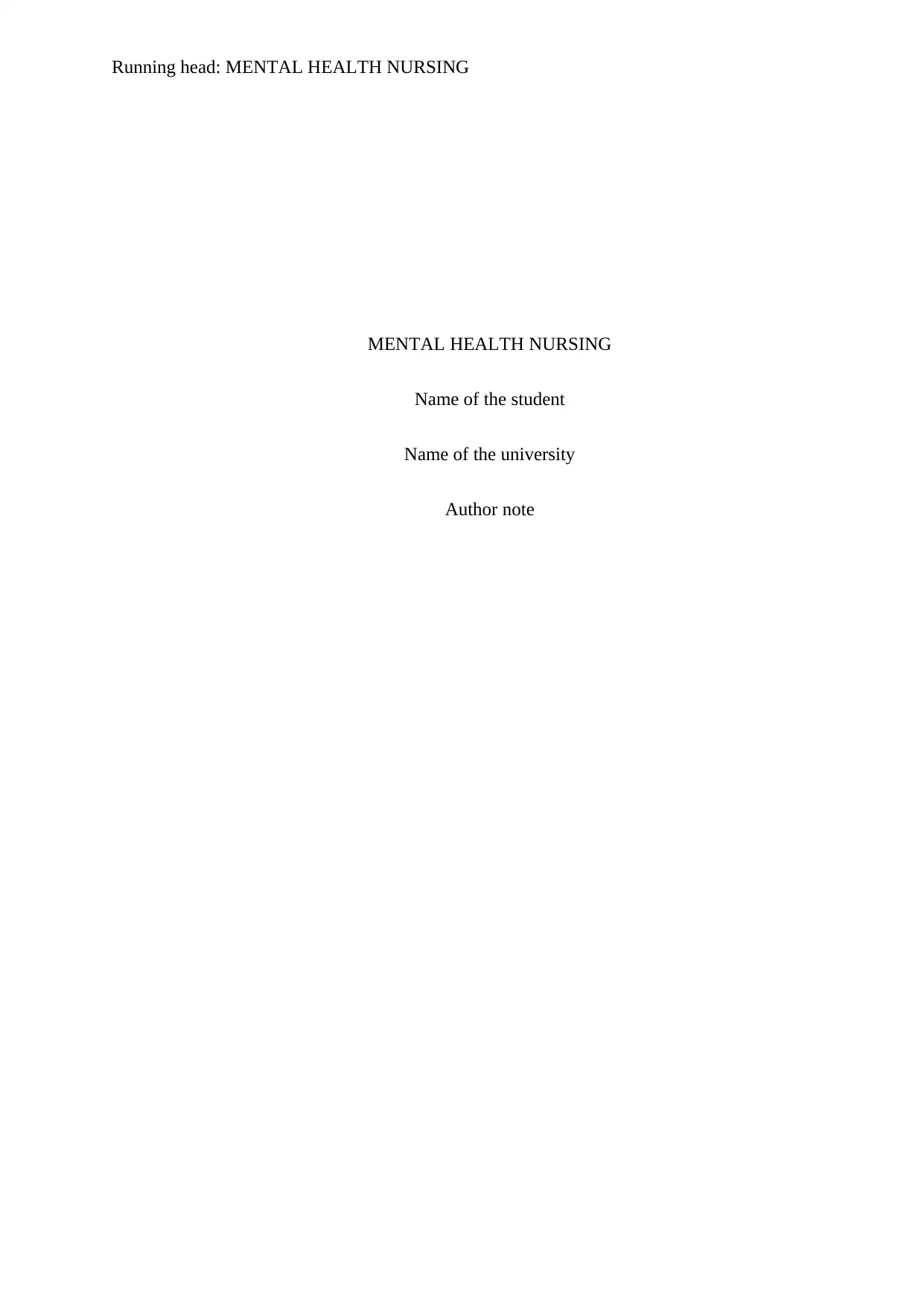
Running head: MENTAL HEALTH NURSING
MENTAL HEALTH NURSING
Name of the student
Name of the university
Author note
MENTAL HEALTH NURSING
Name of the student
Name of the university
Author note
Secure Best Marks with AI Grader
Need help grading? Try our AI Grader for instant feedback on your assignments.
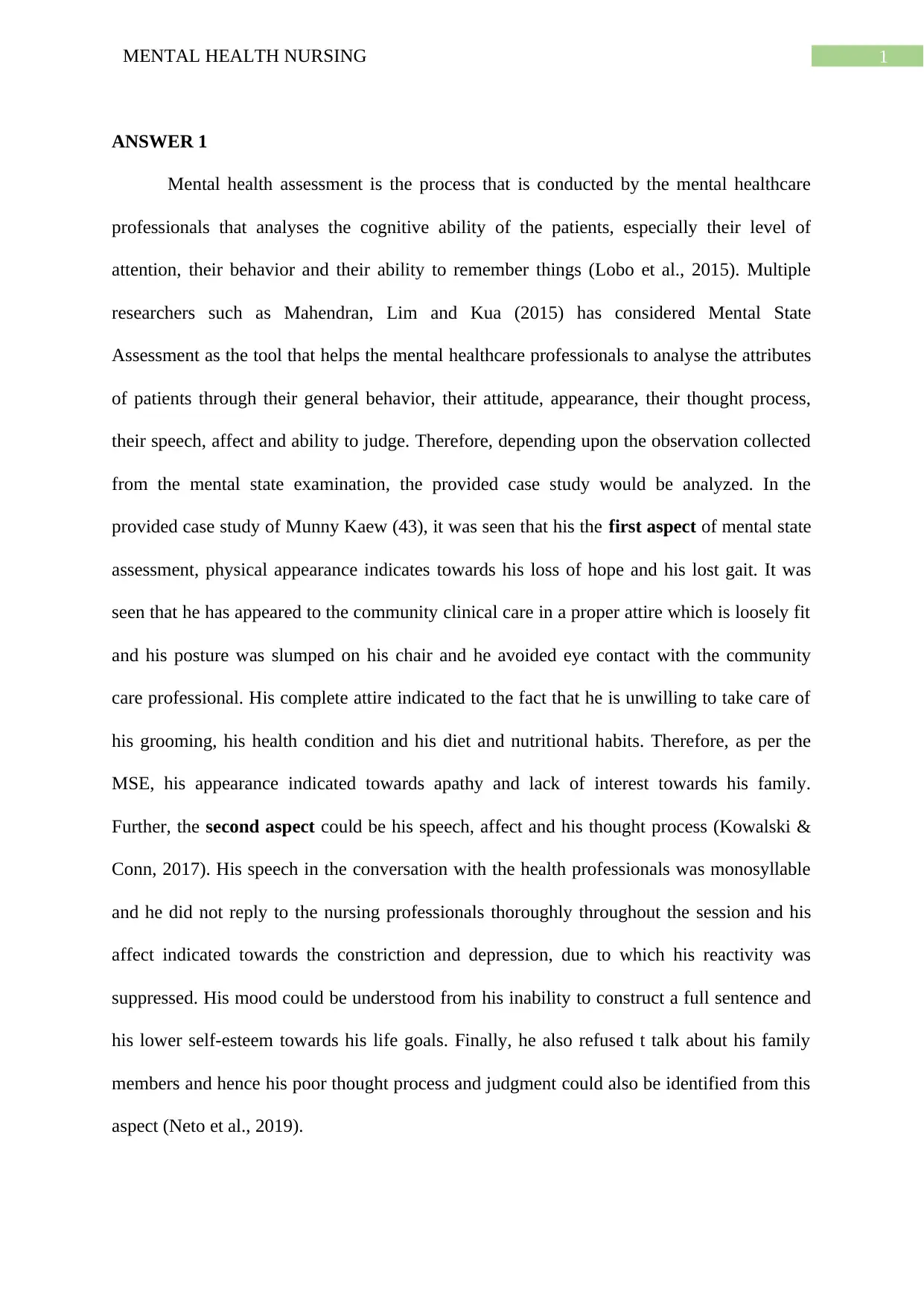
1MENTAL HEALTH NURSING
ANSWER 1
Mental health assessment is the process that is conducted by the mental healthcare
professionals that analyses the cognitive ability of the patients, especially their level of
attention, their behavior and their ability to remember things (Lobo et al., 2015). Multiple
researchers such as Mahendran, Lim and Kua (2015) has considered Mental State
Assessment as the tool that helps the mental healthcare professionals to analyse the attributes
of patients through their general behavior, their attitude, appearance, their thought process,
their speech, affect and ability to judge. Therefore, depending upon the observation collected
from the mental state examination, the provided case study would be analyzed. In the
provided case study of Munny Kaew (43), it was seen that his the first aspect of mental state
assessment, physical appearance indicates towards his loss of hope and his lost gait. It was
seen that he has appeared to the community clinical care in a proper attire which is loosely fit
and his posture was slumped on his chair and he avoided eye contact with the community
care professional. His complete attire indicated to the fact that he is unwilling to take care of
his grooming, his health condition and his diet and nutritional habits. Therefore, as per the
MSE, his appearance indicated towards apathy and lack of interest towards his family.
Further, the second aspect could be his speech, affect and his thought process (Kowalski &
Conn, 2017). His speech in the conversation with the health professionals was monosyllable
and he did not reply to the nursing professionals thoroughly throughout the session and his
affect indicated towards the constriction and depression, due to which his reactivity was
suppressed. His mood could be understood from his inability to construct a full sentence and
his lower self-esteem towards his life goals. Finally, he also refused t talk about his family
members and hence his poor thought process and judgment could also be identified from this
aspect (Neto et al., 2019).
ANSWER 1
Mental health assessment is the process that is conducted by the mental healthcare
professionals that analyses the cognitive ability of the patients, especially their level of
attention, their behavior and their ability to remember things (Lobo et al., 2015). Multiple
researchers such as Mahendran, Lim and Kua (2015) has considered Mental State
Assessment as the tool that helps the mental healthcare professionals to analyse the attributes
of patients through their general behavior, their attitude, appearance, their thought process,
their speech, affect and ability to judge. Therefore, depending upon the observation collected
from the mental state examination, the provided case study would be analyzed. In the
provided case study of Munny Kaew (43), it was seen that his the first aspect of mental state
assessment, physical appearance indicates towards his loss of hope and his lost gait. It was
seen that he has appeared to the community clinical care in a proper attire which is loosely fit
and his posture was slumped on his chair and he avoided eye contact with the community
care professional. His complete attire indicated to the fact that he is unwilling to take care of
his grooming, his health condition and his diet and nutritional habits. Therefore, as per the
MSE, his appearance indicated towards apathy and lack of interest towards his family.
Further, the second aspect could be his speech, affect and his thought process (Kowalski &
Conn, 2017). His speech in the conversation with the health professionals was monosyllable
and he did not reply to the nursing professionals thoroughly throughout the session and his
affect indicated towards the constriction and depression, due to which his reactivity was
suppressed. His mood could be understood from his inability to construct a full sentence and
his lower self-esteem towards his life goals. Finally, he also refused t talk about his family
members and hence his poor thought process and judgment could also be identified from this
aspect (Neto et al., 2019).
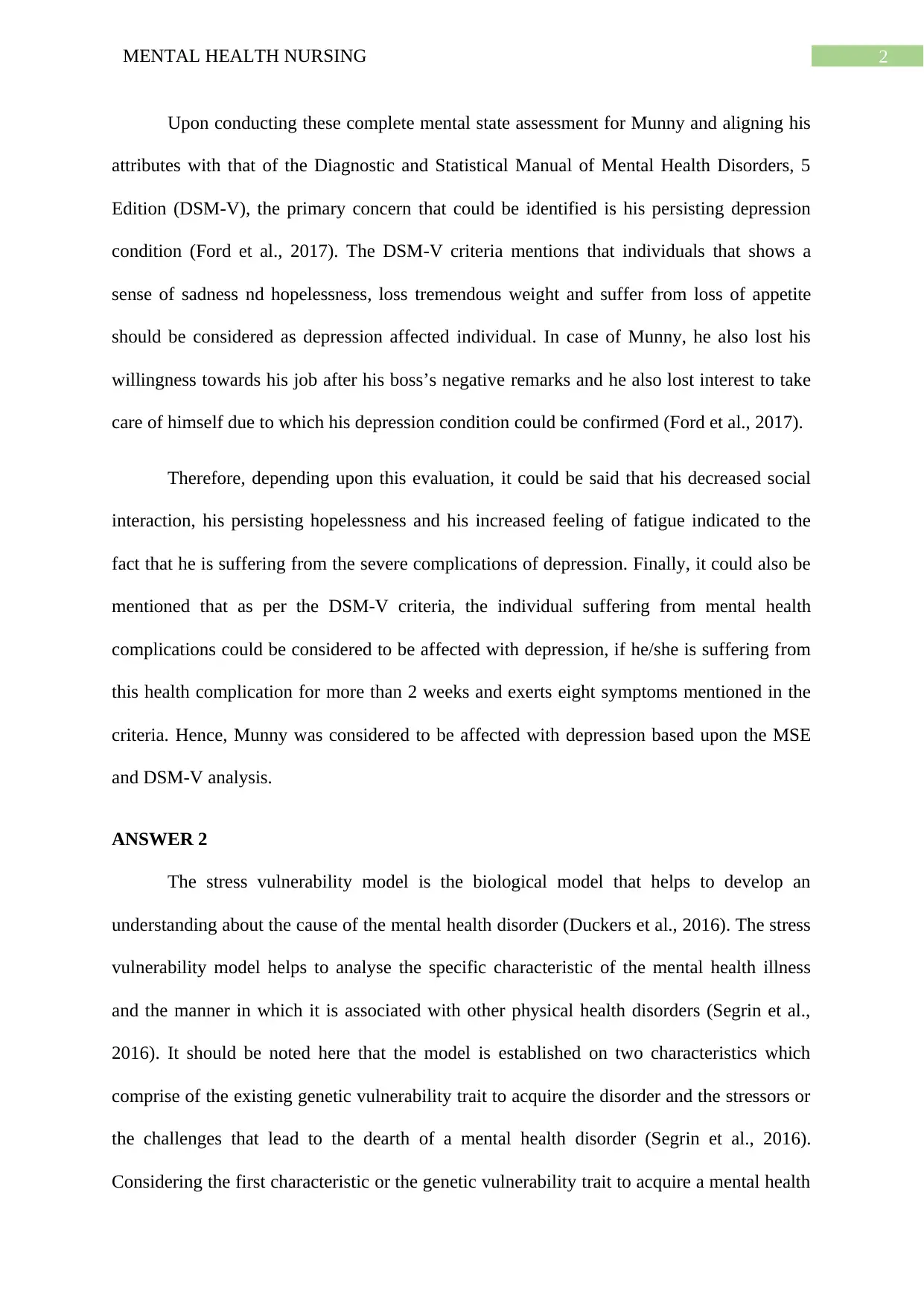
2MENTAL HEALTH NURSING
Upon conducting these complete mental state assessment for Munny and aligning his
attributes with that of the Diagnostic and Statistical Manual of Mental Health Disorders, 5
Edition (DSM-V), the primary concern that could be identified is his persisting depression
condition (Ford et al., 2017). The DSM-V criteria mentions that individuals that shows a
sense of sadness nd hopelessness, loss tremendous weight and suffer from loss of appetite
should be considered as depression affected individual. In case of Munny, he also lost his
willingness towards his job after his boss’s negative remarks and he also lost interest to take
care of himself due to which his depression condition could be confirmed (Ford et al., 2017).
Therefore, depending upon this evaluation, it could be said that his decreased social
interaction, his persisting hopelessness and his increased feeling of fatigue indicated to the
fact that he is suffering from the severe complications of depression. Finally, it could also be
mentioned that as per the DSM-V criteria, the individual suffering from mental health
complications could be considered to be affected with depression, if he/she is suffering from
this health complication for more than 2 weeks and exerts eight symptoms mentioned in the
criteria. Hence, Munny was considered to be affected with depression based upon the MSE
and DSM-V analysis.
ANSWER 2
The stress vulnerability model is the biological model that helps to develop an
understanding about the cause of the mental health disorder (Duckers et al., 2016). The stress
vulnerability model helps to analyse the specific characteristic of the mental health illness
and the manner in which it is associated with other physical health disorders (Segrin et al.,
2016). It should be noted here that the model is established on two characteristics which
comprise of the existing genetic vulnerability trait to acquire the disorder and the stressors or
the challenges that lead to the dearth of a mental health disorder (Segrin et al., 2016).
Considering the first characteristic or the genetic vulnerability trait to acquire a mental health
Upon conducting these complete mental state assessment for Munny and aligning his
attributes with that of the Diagnostic and Statistical Manual of Mental Health Disorders, 5
Edition (DSM-V), the primary concern that could be identified is his persisting depression
condition (Ford et al., 2017). The DSM-V criteria mentions that individuals that shows a
sense of sadness nd hopelessness, loss tremendous weight and suffer from loss of appetite
should be considered as depression affected individual. In case of Munny, he also lost his
willingness towards his job after his boss’s negative remarks and he also lost interest to take
care of himself due to which his depression condition could be confirmed (Ford et al., 2017).
Therefore, depending upon this evaluation, it could be said that his decreased social
interaction, his persisting hopelessness and his increased feeling of fatigue indicated to the
fact that he is suffering from the severe complications of depression. Finally, it could also be
mentioned that as per the DSM-V criteria, the individual suffering from mental health
complications could be considered to be affected with depression, if he/she is suffering from
this health complication for more than 2 weeks and exerts eight symptoms mentioned in the
criteria. Hence, Munny was considered to be affected with depression based upon the MSE
and DSM-V analysis.
ANSWER 2
The stress vulnerability model is the biological model that helps to develop an
understanding about the cause of the mental health disorder (Duckers et al., 2016). The stress
vulnerability model helps to analyse the specific characteristic of the mental health illness
and the manner in which it is associated with other physical health disorders (Segrin et al.,
2016). It should be noted here that the model is established on two characteristics which
comprise of the existing genetic vulnerability trait to acquire the disorder and the stressors or
the challenges that lead to the dearth of a mental health disorder (Segrin et al., 2016).
Considering the first characteristic or the genetic vulnerability trait to acquire a mental health
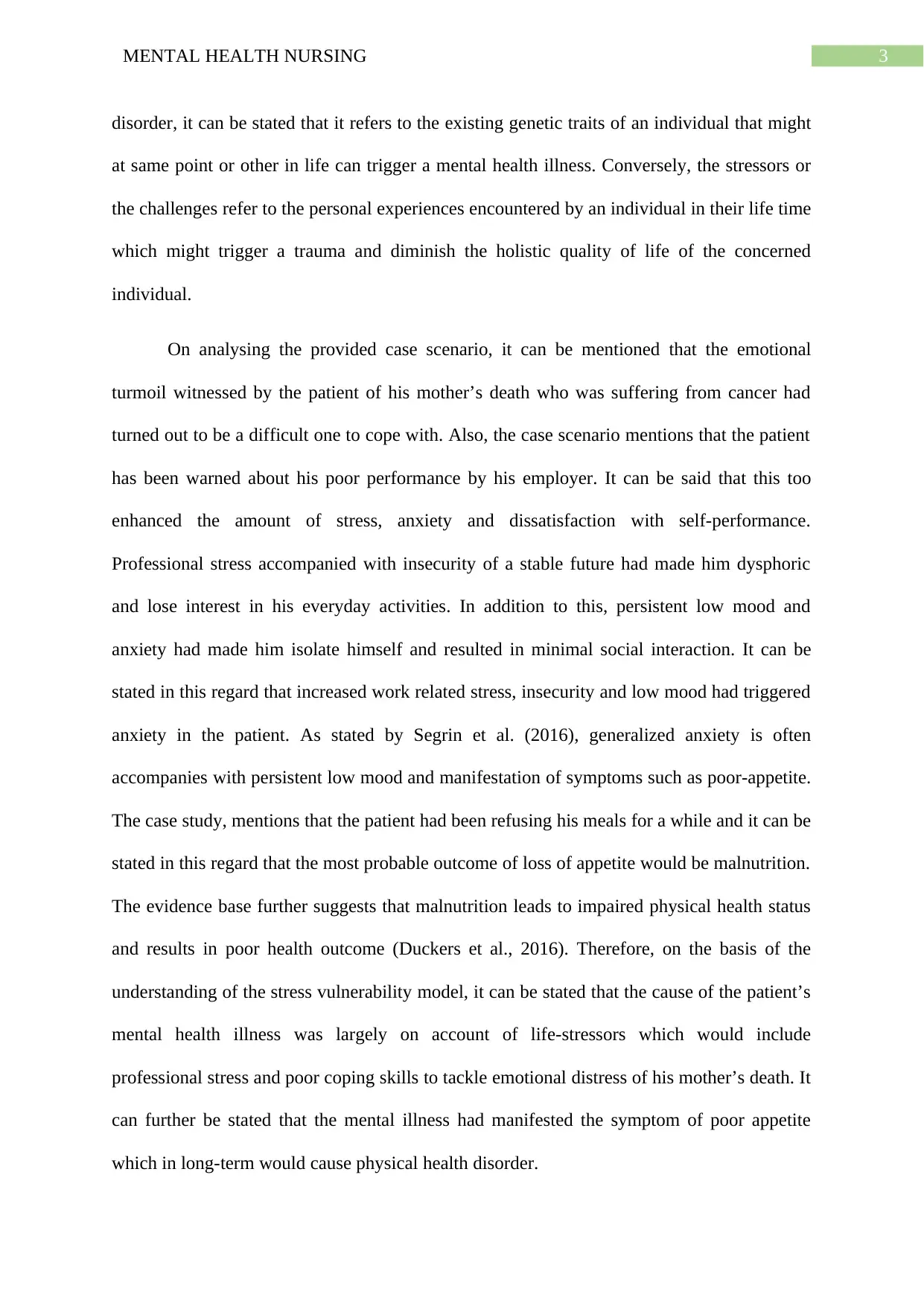
3MENTAL HEALTH NURSING
disorder, it can be stated that it refers to the existing genetic traits of an individual that might
at same point or other in life can trigger a mental health illness. Conversely, the stressors or
the challenges refer to the personal experiences encountered by an individual in their life time
which might trigger a trauma and diminish the holistic quality of life of the concerned
individual.
On analysing the provided case scenario, it can be mentioned that the emotional
turmoil witnessed by the patient of his mother’s death who was suffering from cancer had
turned out to be a difficult one to cope with. Also, the case scenario mentions that the patient
has been warned about his poor performance by his employer. It can be said that this too
enhanced the amount of stress, anxiety and dissatisfaction with self-performance.
Professional stress accompanied with insecurity of a stable future had made him dysphoric
and lose interest in his everyday activities. In addition to this, persistent low mood and
anxiety had made him isolate himself and resulted in minimal social interaction. It can be
stated in this regard that increased work related stress, insecurity and low mood had triggered
anxiety in the patient. As stated by Segrin et al. (2016), generalized anxiety is often
accompanies with persistent low mood and manifestation of symptoms such as poor-appetite.
The case study, mentions that the patient had been refusing his meals for a while and it can be
stated in this regard that the most probable outcome of loss of appetite would be malnutrition.
The evidence base further suggests that malnutrition leads to impaired physical health status
and results in poor health outcome (Duckers et al., 2016). Therefore, on the basis of the
understanding of the stress vulnerability model, it can be stated that the cause of the patient’s
mental health illness was largely on account of life-stressors which would include
professional stress and poor coping skills to tackle emotional distress of his mother’s death. It
can further be stated that the mental illness had manifested the symptom of poor appetite
which in long-term would cause physical health disorder.
disorder, it can be stated that it refers to the existing genetic traits of an individual that might
at same point or other in life can trigger a mental health illness. Conversely, the stressors or
the challenges refer to the personal experiences encountered by an individual in their life time
which might trigger a trauma and diminish the holistic quality of life of the concerned
individual.
On analysing the provided case scenario, it can be mentioned that the emotional
turmoil witnessed by the patient of his mother’s death who was suffering from cancer had
turned out to be a difficult one to cope with. Also, the case scenario mentions that the patient
has been warned about his poor performance by his employer. It can be said that this too
enhanced the amount of stress, anxiety and dissatisfaction with self-performance.
Professional stress accompanied with insecurity of a stable future had made him dysphoric
and lose interest in his everyday activities. In addition to this, persistent low mood and
anxiety had made him isolate himself and resulted in minimal social interaction. It can be
stated in this regard that increased work related stress, insecurity and low mood had triggered
anxiety in the patient. As stated by Segrin et al. (2016), generalized anxiety is often
accompanies with persistent low mood and manifestation of symptoms such as poor-appetite.
The case study, mentions that the patient had been refusing his meals for a while and it can be
stated in this regard that the most probable outcome of loss of appetite would be malnutrition.
The evidence base further suggests that malnutrition leads to impaired physical health status
and results in poor health outcome (Duckers et al., 2016). Therefore, on the basis of the
understanding of the stress vulnerability model, it can be stated that the cause of the patient’s
mental health illness was largely on account of life-stressors which would include
professional stress and poor coping skills to tackle emotional distress of his mother’s death. It
can further be stated that the mental illness had manifested the symptom of poor appetite
which in long-term would cause physical health disorder.
Secure Best Marks with AI Grader
Need help grading? Try our AI Grader for instant feedback on your assignments.
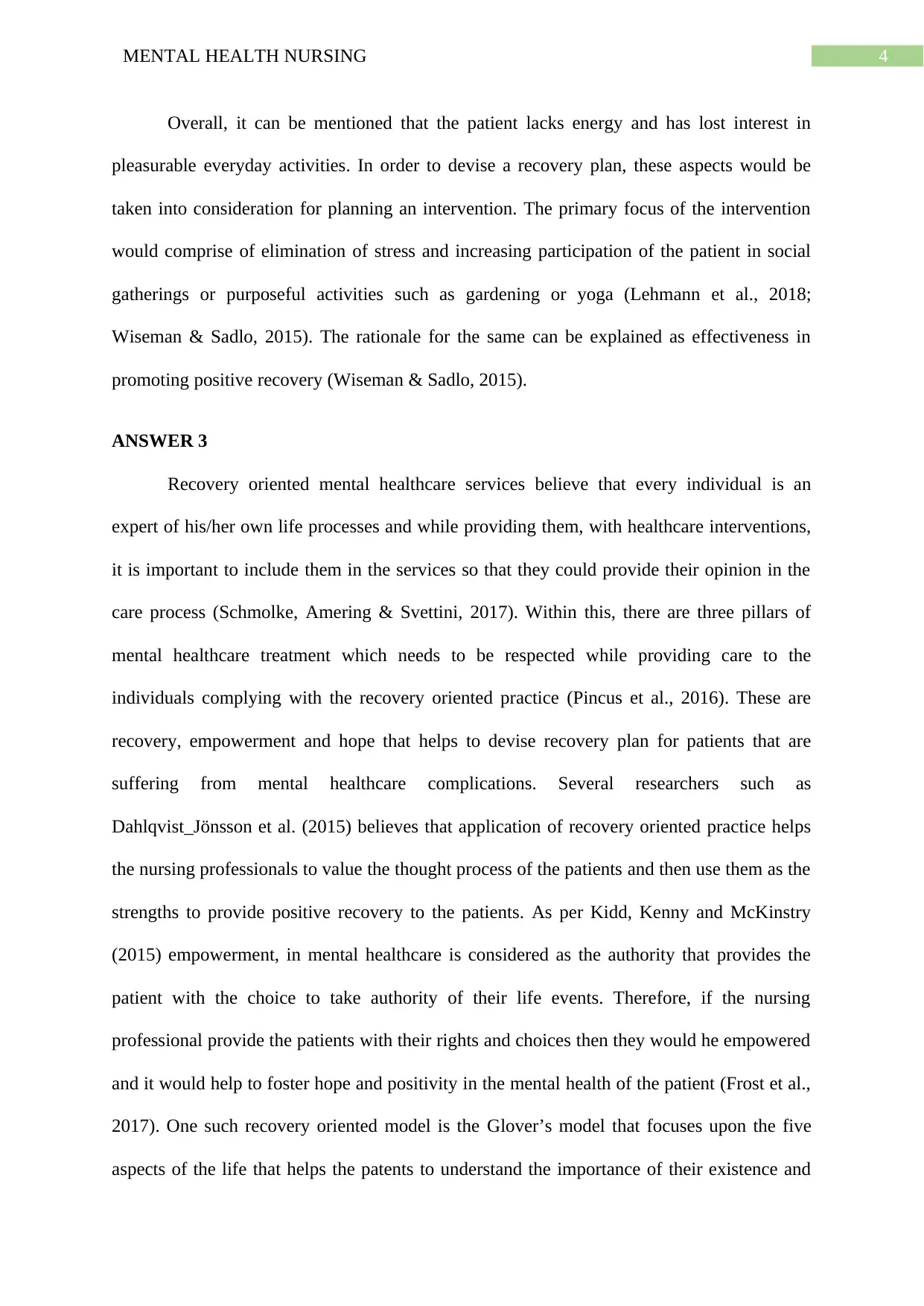
4MENTAL HEALTH NURSING
Overall, it can be mentioned that the patient lacks energy and has lost interest in
pleasurable everyday activities. In order to devise a recovery plan, these aspects would be
taken into consideration for planning an intervention. The primary focus of the intervention
would comprise of elimination of stress and increasing participation of the patient in social
gatherings or purposeful activities such as gardening or yoga (Lehmann et al., 2018;
Wiseman & Sadlo, 2015). The rationale for the same can be explained as effectiveness in
promoting positive recovery (Wiseman & Sadlo, 2015).
ANSWER 3
Recovery oriented mental healthcare services believe that every individual is an
expert of his/her own life processes and while providing them, with healthcare interventions,
it is important to include them in the services so that they could provide their opinion in the
care process (Schmolke, Amering & Svettini, 2017). Within this, there are three pillars of
mental healthcare treatment which needs to be respected while providing care to the
individuals complying with the recovery oriented practice (Pincus et al., 2016). These are
recovery, empowerment and hope that helps to devise recovery plan for patients that are
suffering from mental healthcare complications. Several researchers such as
Dahlqvist_Jönsson et al. (2015) believes that application of recovery oriented practice helps
the nursing professionals to value the thought process of the patients and then use them as the
strengths to provide positive recovery to the patients. As per Kidd, Kenny and McKinstry
(2015) empowerment, in mental healthcare is considered as the authority that provides the
patient with the choice to take authority of their life events. Therefore, if the nursing
professional provide the patients with their rights and choices then they would he empowered
and it would help to foster hope and positivity in the mental health of the patient (Frost et al.,
2017). One such recovery oriented model is the Glover’s model that focuses upon the five
aspects of the life that helps the patents to understand the importance of their existence and
Overall, it can be mentioned that the patient lacks energy and has lost interest in
pleasurable everyday activities. In order to devise a recovery plan, these aspects would be
taken into consideration for planning an intervention. The primary focus of the intervention
would comprise of elimination of stress and increasing participation of the patient in social
gatherings or purposeful activities such as gardening or yoga (Lehmann et al., 2018;
Wiseman & Sadlo, 2015). The rationale for the same can be explained as effectiveness in
promoting positive recovery (Wiseman & Sadlo, 2015).
ANSWER 3
Recovery oriented mental healthcare services believe that every individual is an
expert of his/her own life processes and while providing them, with healthcare interventions,
it is important to include them in the services so that they could provide their opinion in the
care process (Schmolke, Amering & Svettini, 2017). Within this, there are three pillars of
mental healthcare treatment which needs to be respected while providing care to the
individuals complying with the recovery oriented practice (Pincus et al., 2016). These are
recovery, empowerment and hope that helps to devise recovery plan for patients that are
suffering from mental healthcare complications. Several researchers such as
Dahlqvist_Jönsson et al. (2015) believes that application of recovery oriented practice helps
the nursing professionals to value the thought process of the patients and then use them as the
strengths to provide positive recovery to the patients. As per Kidd, Kenny and McKinstry
(2015) empowerment, in mental healthcare is considered as the authority that provides the
patient with the choice to take authority of their life events. Therefore, if the nursing
professional provide the patients with their rights and choices then they would he empowered
and it would help to foster hope and positivity in the mental health of the patient (Frost et al.,
2017). One such recovery oriented model is the Glover’s model that focuses upon the five
aspects of the life that helps the patents to understand the importance of their existence and
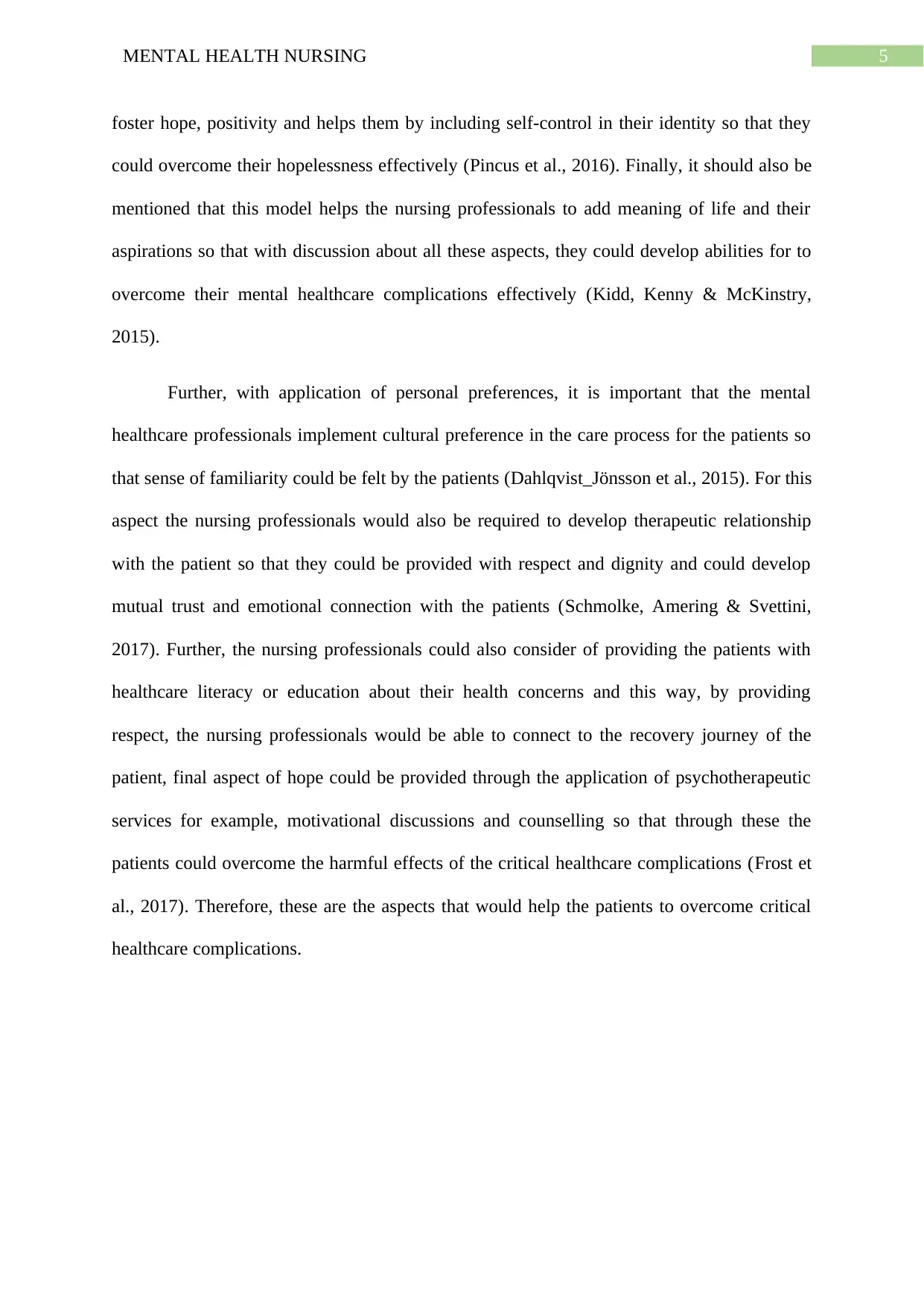
5MENTAL HEALTH NURSING
foster hope, positivity and helps them by including self-control in their identity so that they
could overcome their hopelessness effectively (Pincus et al., 2016). Finally, it should also be
mentioned that this model helps the nursing professionals to add meaning of life and their
aspirations so that with discussion about all these aspects, they could develop abilities for to
overcome their mental healthcare complications effectively (Kidd, Kenny & McKinstry,
2015).
Further, with application of personal preferences, it is important that the mental
healthcare professionals implement cultural preference in the care process for the patients so
that sense of familiarity could be felt by the patients (Dahlqvist_Jönsson et al., 2015). For this
aspect the nursing professionals would also be required to develop therapeutic relationship
with the patient so that they could be provided with respect and dignity and could develop
mutual trust and emotional connection with the patients (Schmolke, Amering & Svettini,
2017). Further, the nursing professionals could also consider of providing the patients with
healthcare literacy or education about their health concerns and this way, by providing
respect, the nursing professionals would be able to connect to the recovery journey of the
patient, final aspect of hope could be provided through the application of psychotherapeutic
services for example, motivational discussions and counselling so that through these the
patients could overcome the harmful effects of the critical healthcare complications (Frost et
al., 2017). Therefore, these are the aspects that would help the patients to overcome critical
healthcare complications.
foster hope, positivity and helps them by including self-control in their identity so that they
could overcome their hopelessness effectively (Pincus et al., 2016). Finally, it should also be
mentioned that this model helps the nursing professionals to add meaning of life and their
aspirations so that with discussion about all these aspects, they could develop abilities for to
overcome their mental healthcare complications effectively (Kidd, Kenny & McKinstry,
2015).
Further, with application of personal preferences, it is important that the mental
healthcare professionals implement cultural preference in the care process for the patients so
that sense of familiarity could be felt by the patients (Dahlqvist_Jönsson et al., 2015). For this
aspect the nursing professionals would also be required to develop therapeutic relationship
with the patient so that they could be provided with respect and dignity and could develop
mutual trust and emotional connection with the patients (Schmolke, Amering & Svettini,
2017). Further, the nursing professionals could also consider of providing the patients with
healthcare literacy or education about their health concerns and this way, by providing
respect, the nursing professionals would be able to connect to the recovery journey of the
patient, final aspect of hope could be provided through the application of psychotherapeutic
services for example, motivational discussions and counselling so that through these the
patients could overcome the harmful effects of the critical healthcare complications (Frost et
al., 2017). Therefore, these are the aspects that would help the patients to overcome critical
healthcare complications.
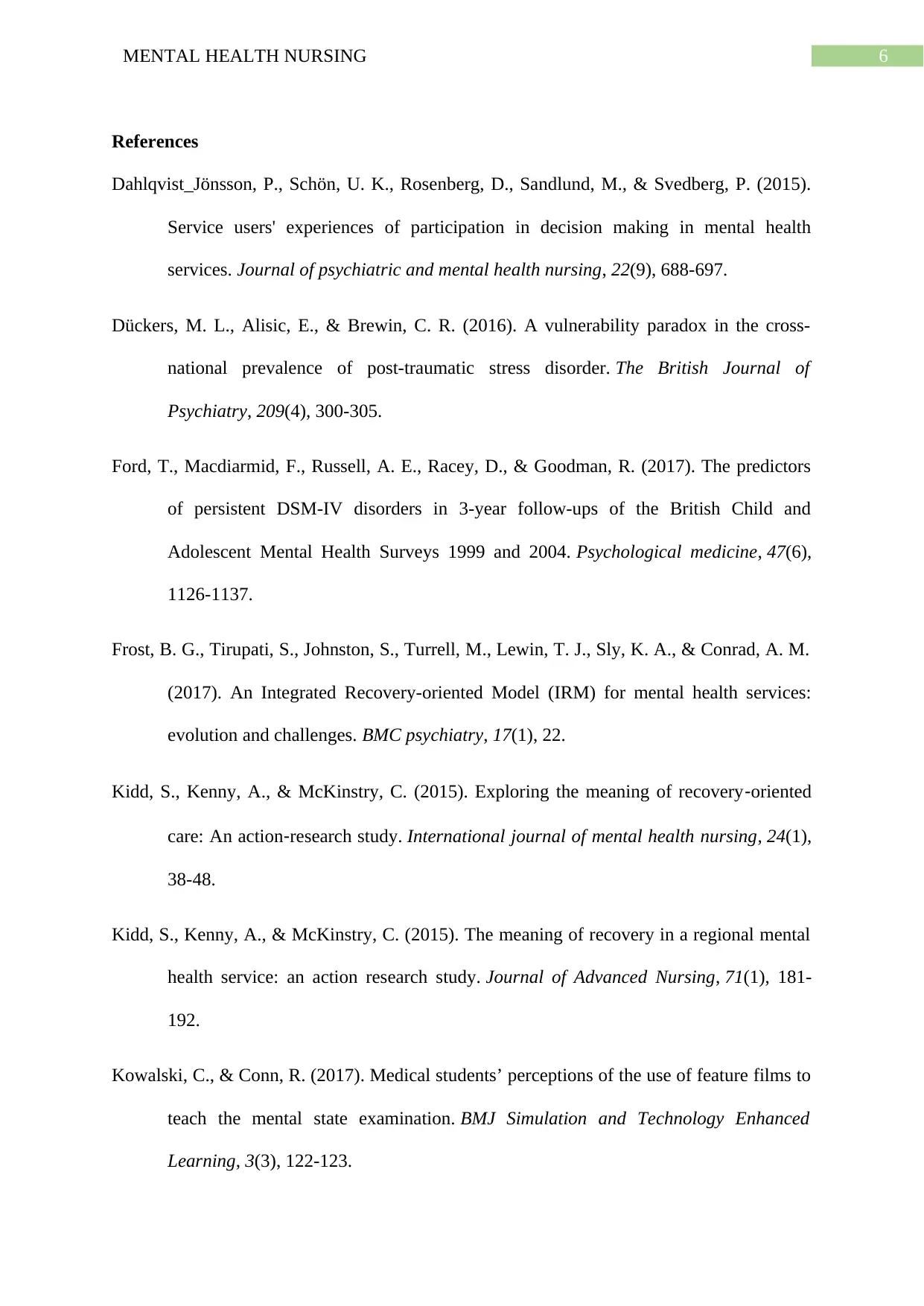
6MENTAL HEALTH NURSING
References
Dahlqvist_Jönsson, P., Schön, U. K., Rosenberg, D., Sandlund, M., & Svedberg, P. (2015).
Service users' experiences of participation in decision making in mental health
services. Journal of psychiatric and mental health nursing, 22(9), 688-697.
Dückers, M. L., Alisic, E., & Brewin, C. R. (2016). A vulnerability paradox in the cross-
national prevalence of post-traumatic stress disorder. The British Journal of
Psychiatry, 209(4), 300-305.
Ford, T., Macdiarmid, F., Russell, A. E., Racey, D., & Goodman, R. (2017). The predictors
of persistent DSM-IV disorders in 3-year follow-ups of the British Child and
Adolescent Mental Health Surveys 1999 and 2004. Psychological medicine, 47(6),
1126-1137.
Frost, B. G., Tirupati, S., Johnston, S., Turrell, M., Lewin, T. J., Sly, K. A., & Conrad, A. M.
(2017). An Integrated Recovery-oriented Model (IRM) for mental health services:
evolution and challenges. BMC psychiatry, 17(1), 22.
Kidd, S., Kenny, A., & McKinstry, C. (2015). Exploring the meaning of recovery‐oriented
care: An action‐research study. International journal of mental health nursing, 24(1),
38-48.
Kidd, S., Kenny, A., & McKinstry, C. (2015). The meaning of recovery in a regional mental
health service: an action research study. Journal of Advanced Nursing, 71(1), 181-
192.
Kowalski, C., & Conn, R. (2017). Medical students’ perceptions of the use of feature films to
teach the mental state examination. BMJ Simulation and Technology Enhanced
Learning, 3(3), 122-123.
References
Dahlqvist_Jönsson, P., Schön, U. K., Rosenberg, D., Sandlund, M., & Svedberg, P. (2015).
Service users' experiences of participation in decision making in mental health
services. Journal of psychiatric and mental health nursing, 22(9), 688-697.
Dückers, M. L., Alisic, E., & Brewin, C. R. (2016). A vulnerability paradox in the cross-
national prevalence of post-traumatic stress disorder. The British Journal of
Psychiatry, 209(4), 300-305.
Ford, T., Macdiarmid, F., Russell, A. E., Racey, D., & Goodman, R. (2017). The predictors
of persistent DSM-IV disorders in 3-year follow-ups of the British Child and
Adolescent Mental Health Surveys 1999 and 2004. Psychological medicine, 47(6),
1126-1137.
Frost, B. G., Tirupati, S., Johnston, S., Turrell, M., Lewin, T. J., Sly, K. A., & Conrad, A. M.
(2017). An Integrated Recovery-oriented Model (IRM) for mental health services:
evolution and challenges. BMC psychiatry, 17(1), 22.
Kidd, S., Kenny, A., & McKinstry, C. (2015). Exploring the meaning of recovery‐oriented
care: An action‐research study. International journal of mental health nursing, 24(1),
38-48.
Kidd, S., Kenny, A., & McKinstry, C. (2015). The meaning of recovery in a regional mental
health service: an action research study. Journal of Advanced Nursing, 71(1), 181-
192.
Kowalski, C., & Conn, R. (2017). Medical students’ perceptions of the use of feature films to
teach the mental state examination. BMJ Simulation and Technology Enhanced
Learning, 3(3), 122-123.
Paraphrase This Document
Need a fresh take? Get an instant paraphrase of this document with our AI Paraphraser
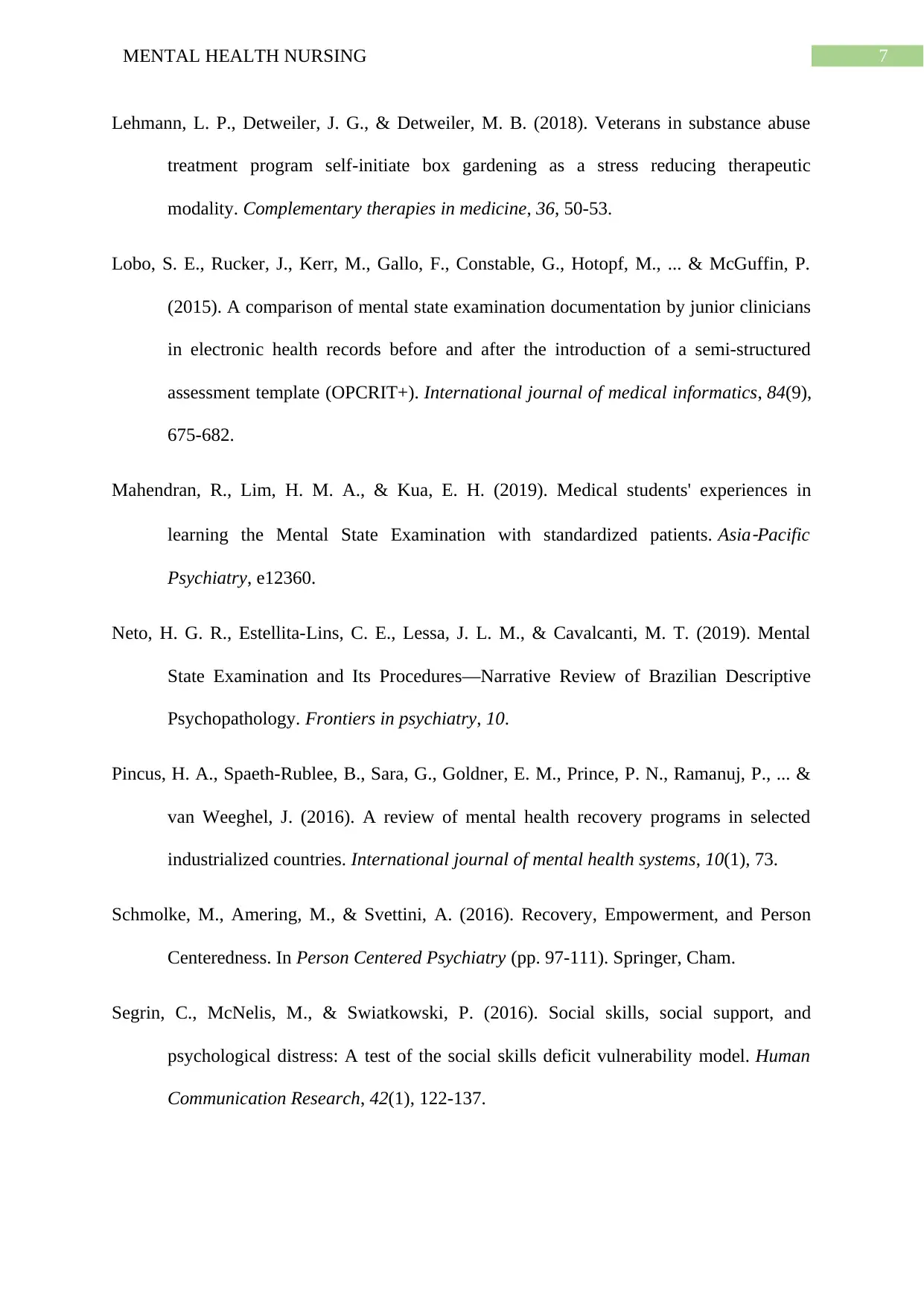
7MENTAL HEALTH NURSING
Lehmann, L. P., Detweiler, J. G., & Detweiler, M. B. (2018). Veterans in substance abuse
treatment program self-initiate box gardening as a stress reducing therapeutic
modality. Complementary therapies in medicine, 36, 50-53.
Lobo, S. E., Rucker, J., Kerr, M., Gallo, F., Constable, G., Hotopf, M., ... & McGuffin, P.
(2015). A comparison of mental state examination documentation by junior clinicians
in electronic health records before and after the introduction of a semi-structured
assessment template (OPCRIT+). International journal of medical informatics, 84(9),
675-682.
Mahendran, R., Lim, H. M. A., & Kua, E. H. (2019). Medical students' experiences in
learning the Mental State Examination with standardized patients. Asia
‐Pacific
Psychiatry, e12360.
Neto, H. G. R., Estellita-Lins, C. E., Lessa, J. L. M., & Cavalcanti, M. T. (2019). Mental
State Examination and Its Procedures—Narrative Review of Brazilian Descriptive
Psychopathology. Frontiers in psychiatry, 10.
Pincus, H. A., Spaeth-Rublee, B., Sara, G., Goldner, E. M., Prince, P. N., Ramanuj, P., ... &
van Weeghel, J. (2016). A review of mental health recovery programs in selected
industrialized countries. International journal of mental health systems, 10(1), 73.
Schmolke, M., Amering, M., & Svettini, A. (2016). Recovery, Empowerment, and Person
Centeredness. In Person Centered Psychiatry (pp. 97-111). Springer, Cham.
Segrin, C., McNelis, M., & Swiatkowski, P. (2016). Social skills, social support, and
psychological distress: A test of the social skills deficit vulnerability model. Human
Communication Research, 42(1), 122-137.
Lehmann, L. P., Detweiler, J. G., & Detweiler, M. B. (2018). Veterans in substance abuse
treatment program self-initiate box gardening as a stress reducing therapeutic
modality. Complementary therapies in medicine, 36, 50-53.
Lobo, S. E., Rucker, J., Kerr, M., Gallo, F., Constable, G., Hotopf, M., ... & McGuffin, P.
(2015). A comparison of mental state examination documentation by junior clinicians
in electronic health records before and after the introduction of a semi-structured
assessment template (OPCRIT+). International journal of medical informatics, 84(9),
675-682.
Mahendran, R., Lim, H. M. A., & Kua, E. H. (2019). Medical students' experiences in
learning the Mental State Examination with standardized patients. Asia
‐Pacific
Psychiatry, e12360.
Neto, H. G. R., Estellita-Lins, C. E., Lessa, J. L. M., & Cavalcanti, M. T. (2019). Mental
State Examination and Its Procedures—Narrative Review of Brazilian Descriptive
Psychopathology. Frontiers in psychiatry, 10.
Pincus, H. A., Spaeth-Rublee, B., Sara, G., Goldner, E. M., Prince, P. N., Ramanuj, P., ... &
van Weeghel, J. (2016). A review of mental health recovery programs in selected
industrialized countries. International journal of mental health systems, 10(1), 73.
Schmolke, M., Amering, M., & Svettini, A. (2016). Recovery, Empowerment, and Person
Centeredness. In Person Centered Psychiatry (pp. 97-111). Springer, Cham.
Segrin, C., McNelis, M., & Swiatkowski, P. (2016). Social skills, social support, and
psychological distress: A test of the social skills deficit vulnerability model. Human
Communication Research, 42(1), 122-137.
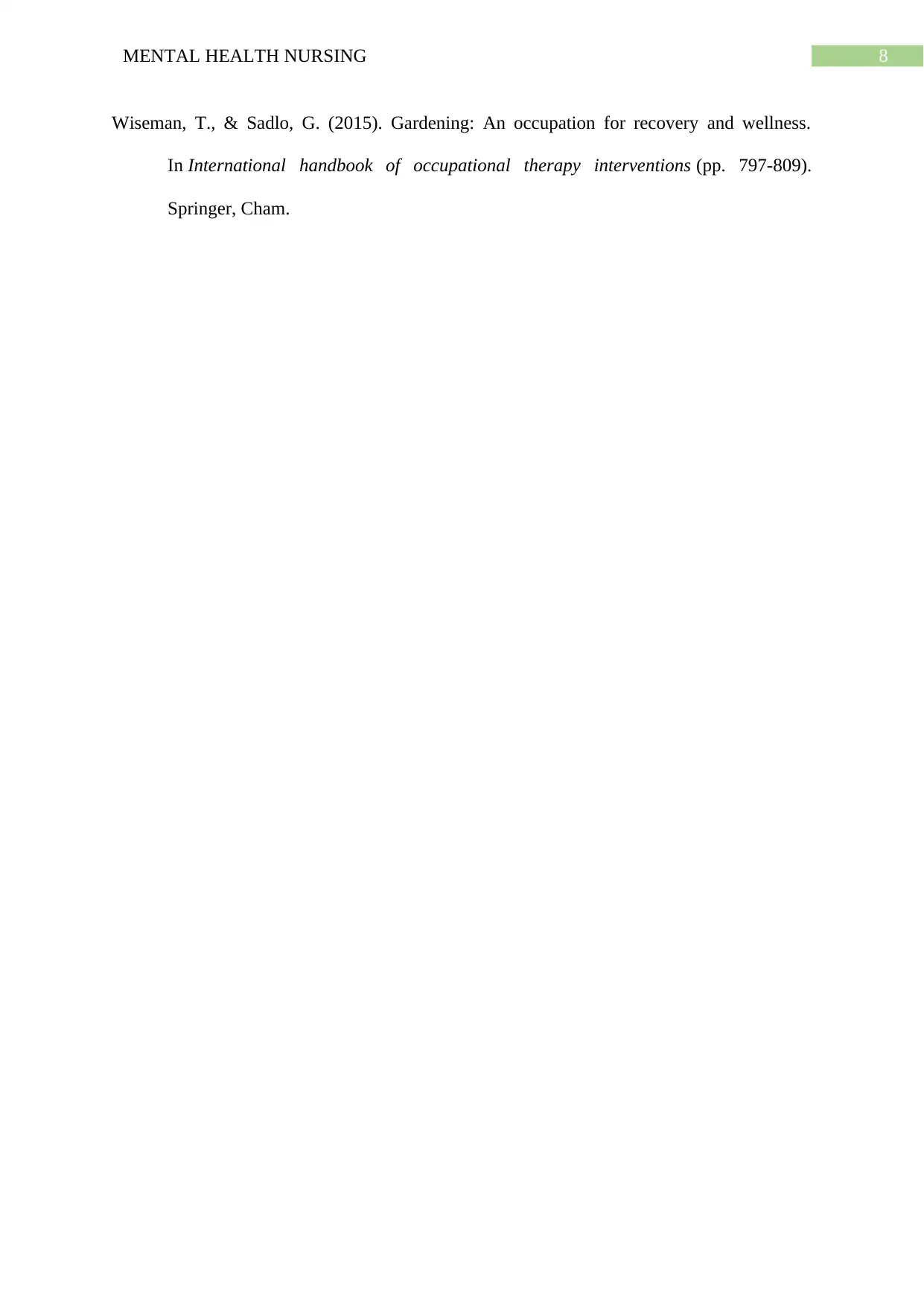
8MENTAL HEALTH NURSING
Wiseman, T., & Sadlo, G. (2015). Gardening: An occupation for recovery and wellness.
In International handbook of occupational therapy interventions (pp. 797-809).
Springer, Cham.
Wiseman, T., & Sadlo, G. (2015). Gardening: An occupation for recovery and wellness.
In International handbook of occupational therapy interventions (pp. 797-809).
Springer, Cham.
1 out of 9
Related Documents
Your All-in-One AI-Powered Toolkit for Academic Success.
+13062052269
info@desklib.com
Available 24*7 on WhatsApp / Email
![[object Object]](/_next/static/media/star-bottom.7253800d.svg)
Unlock your academic potential
© 2024 | Zucol Services PVT LTD | All rights reserved.





